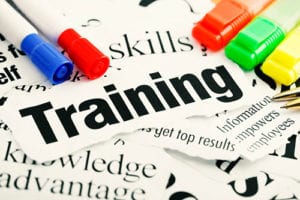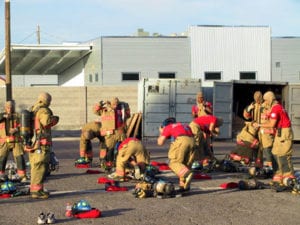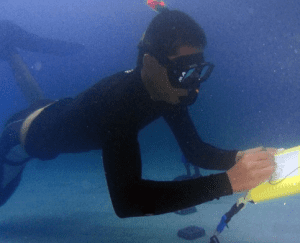 As public safety providers, we could make a fundamental improvement in developing situational awareness by looking at how we train responders. [tweet this] There are some valuable lessons from brain science that can help you improve the design of your program. One is called context dependent learning. It has been validated through numerous studies and I was actually introduced to it by a professor in my graduate school psychology class. If you are a training officer, this article may cause you to rethink how to train your members.
As public safety providers, we could make a fundamental improvement in developing situational awareness by looking at how we train responders. [tweet this] There are some valuable lessons from brain science that can help you improve the design of your program. One is called context dependent learning. It has been validated through numerous studies and I was actually introduced to it by a professor in my graduate school psychology class. If you are a training officer, this article may cause you to rethink how to train your members.
 The concept of context dependent learning is fundamentally simple[tweet this] , yet often overlooked in the training of first responders. Essentially, it means if we train responders in the same environment in which they are going to perform their work they are far more likely to recall their lessons when put back into the same environment on the job.
The concept of context dependent learning is fundamentally simple[tweet this] , yet often overlooked in the training of first responders. Essentially, it means if we train responders in the same environment in which they are going to perform their work they are far more likely to recall their lessons when put back into the same environment on the job.
As I stated earlier, I was first introduced to this in graduate school when my professor challenged the students to study for the final exam in the classroom where we would take the test. He stated he’d make sure the room was unlocked all weekend so any of us could come there to study.
As it was an executive MBA program everyone was working professionals and no one resided on campus. This meant it might be inconvenient, maybe even difficult, for students to come to the classroom to study. I took him up on his challenge though and spent an entire Saturday in that classroom studying my notes and preparing for this challenging final exam.
By golly, it worked! I got 100% on the final exam and accolades from the professor in front of the entire class. He asked me to share my secret for preparing because he’d never had anyone earn a perfect score on one of his final exams. You could have seen the jaws drop when I said I came to the classroom to study for the final. The professor donned a wide smile. Context dependent learning was validated.
 A more formal research study involved two groups of SCUBA divers. One was the test group and one was the control group. The researchers put the test group in ten feet of water and gave them some information to memorize. They did the same thing with the control group, except the control group was on land. Then the researchers tested the participants by putting both groups in ten feet of water and asked them to answer questions about what they had learned. The group that learned the information while in the water did remarkably better in recalling the information than the group that learned the information while standing on dry land. This, is context dependent learning. It can work in SCUBA and it can work in firefighting. If we train firefighter how to perform hands-on tasks while in a classroom, they are likely to recall less of what they learned.[tweet this]
A more formal research study involved two groups of SCUBA divers. One was the test group and one was the control group. The researchers put the test group in ten feet of water and gave them some information to memorize. They did the same thing with the control group, except the control group was on land. Then the researchers tested the participants by putting both groups in ten feet of water and asked them to answer questions about what they had learned. The group that learned the information while in the water did remarkably better in recalling the information than the group that learned the information while standing on dry land. This, is context dependent learning. It can work in SCUBA and it can work in firefighting. If we train firefighter how to perform hands-on tasks while in a classroom, they are likely to recall less of what they learned.[tweet this]
Chief Gasaway’s Advice

Train responders in the environment in which they will be performing their tasks. It may seem trivial, but science suggests the brain ties the lessons to the environment. The more the learning environment mimics the working environment, the strong the lessons are encoded into memory.
I recall learning so many of my fire, rescue, and EMS lessons either in a classroom or an apparatus bay. It wasn’t very realistic, that’s for sure. Now I am most critical of incident command courses that are conducted in classrooms because the environment is not context dependent. To improve recall, put commanders in their natural working environment and teach them how to command. The lessons will be more readily recalled when needed most.
Action Items
 1. When you were trained in your basic fire or EMS skills, did your learning environment always mimic the real-world environment you would operate in?
1. When you were trained in your basic fire or EMS skills, did your learning environment always mimic the real-world environment you would operate in?
2. Provide some examples where instructors taught basic skills in a context dependent environment that you would consider unique.
3. Share some ideas for how your training programs could be improved by using context dependent learning.
_____________________________________________________________
The mission of Situational Awareness Matters is simple: Help first responders see the bad things coming… in time to change the outcome.
Safety begins with SA!
_____________________________________________________________
Share your comments on this article in the “Leave a Reply” box below. If you want to send me incident pictures, videos or have an idea you’d like me to research and write about, contact me. I really enjoy getting feedback and supportive messages from fellow first responders. It gives me the energy to work harder for you.
Thanks,

Email: Support@RichGasaway.com
Phone: 612-548-4424
Facebook Fan Page: www.facebook.com/SAMatters
Twitter: @SAMatters
LinkedIn: Rich Gasaway
YouTube: SAMattersTV
iTunes: SAMatters Radio

